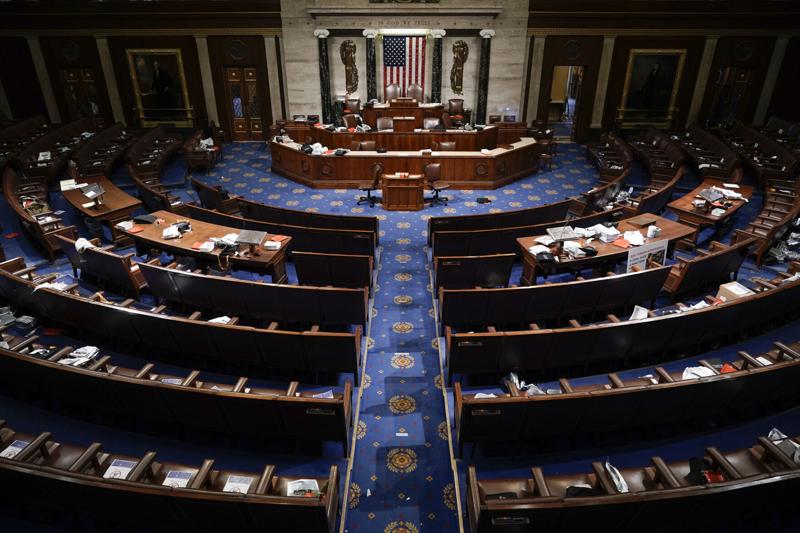Voters are evenly divided nationwide on whether they will vote for the Democrat or the Republican running for Congress in their district, according to new polling.
The Center Square Voters’ Voice Poll, conducted in conjunction with Noble Predictive Insights, asked likely voters whether they would vote for the Democratic or Republican Congressional candidate in their district, to which 46% said they would support the Democratic candidate and 45% said they would support the Republican candidate, with 8% unsure and 1% saying “other.”
Republicans currently hold a slight majority in the U.S. House with 220 seats to Democrats’ 212 and three vacancies. All 435 House seats are up for election on Nov. 5.
“The majority in the House is really a coin toss at this point,” David Byler, head of research at Noble Predictive Insights, told The Center Square. “Nobody really knows what’s going to happen.”
The 46%-45% split is well within the poll’s +/- 2.1% margin of error, making election results uncertain, Byler noted.
The Center Square Voters’ Voice Poll – one of only six national tracking polls in the United States – asked 2,290 likely voters to assess both presidential candidates and identify which policy issues they are most concerned with heading into the November election, among other questions.
Breaking down polling results by demographic, 80% of Black voters polled said that they would vote for the Democratic candidate compared to only 40% of white voters saying they would vote for the Democratic candidate.
Another large notable demographic indicator is where voters are geographically. According to the poll, urban voters are more likely to vote for the Democratic candidate while suburban and rural voters are more likely to vote for the Republican candidate.
Additionally, those residing in the northeast, midwest and west are more likely to vote for the Democratic candidate and those living in the south are more likely to vote for the Republican candidate.
The poll also noted that Independent voters seem to be split pretty evenly when it comes to which candidate they would vote for.
Byler said that there are solid issues that parties emphasize that appeal to different voter demographics. For example, he said the majority of women said that they would vote for the Democratic candidate – something he says is due in part to the talking points of the Democratic candidates.
“Democrats often talk about abortion and talk about issues that they think are especially salient for women,” Byler said. “At this point, in the last couple of election cycles, Democrats have nominated two women at the top of a major party ticket.”
In contrast, Byler noted that former President Donald Trump and Vice Presidential candidate JD Vance have emphasized a lot of issues important to young and working class men.
According to the poll, the top issues for Republican voters are illegal immigration, inflation and the economy. The top three issues for Democratic voters are abortion, inflation and climate change, and the top three issues for Independent voters are inflation, illegal immigration and the economy.
Due to redistricting and a number of open seats, there are quite a few closely contested Congressional races, according to The Center for Politics Sabato’s Crystal Ball. Here are some of the races to watch:
Arizona’s 1st Congressional District: Republican incumbent David Schweikert will be facing Democratic candidate Amish Shah in the general election. Following redistricting in 2020, Schweikert changed from Arizona’s 6th Congressional District to the 1st. Additionally, after the state approved new legislative maps in 2022, the 1st district shifted from a district that voted for Trump to one that would have voted for President Joe Biden. Furthermore, Schweikert won his last election by an incredibly narrow margin at 50.4% to 49.6%.
California’s 13th Congressional District: This district will be seeing a rematch from 2022 where Republican incumbent John Duarte will once again be running against Democrat Adam Gray. Duarte won the 2022 race by only 564 votes, making it the second closest House race in the country that year. Furthermore, CD 13 has typically been a Democratic-led district with Duarte being the first Republican to win the district since 1974.
California’s 22nd Congressional District: In another rematch from 2022, Republican incumbent David Valado will be going up against Democrat Rudy Salas. Valado won that race by 3%. Valado was also only one of 14 Republicans to win a Congressional district that Biden won in 2020.
Colorado’s 8th Congressional District: Democratic incumbent Yadira Caraveo will be running against Republican Gabe Evans and five other candidates. Caraveo won her 2022 election by less than 1%, making it one of the narrowest House races nationwide that year.
Maine’s 2nd Congressional District: This district has the potential to flip Republican this year. Democratic incumbent Jared Golden was one of five Democrats to have won a district that Trump won both in 2016 and 2020. He will be running against Republican Austin Theriault.






